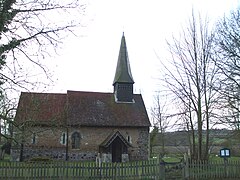Human settlement in England
| Ulting | |
|---|---|
 All Saints' Church All Saints' Church | |
 | |
| Population | 167 (2011) |
| District | |
| Shire county | |
| Region | |
| Country | England |
| Sovereign state | United Kingdom |
| Post town | Chelmsford |
| Postcode district | CM9 |
| Police | Essex |
| Fire | Essex |
| Ambulance | East of England |
| UK Parliament | |
| 51°45′01″N 0°36′35″E / 51.75028°N 0.60972°E / 51.75028; 0.60972 | |
Ulting is a small village and civil parish in the Maldon district, in the county of Essex, England. It shares its borders with Langford and Nounsley. It the location of Ulting Wick garden.
History
Ulting was the location of the first sugar beet factory in England, although its useful life was cut short by cheap imports of cane sugar.
Ernest Doe & Sons produced farm machinery in the 1950s and 1960s, including the odd Doe Triple-D tractor.
Church
All Saints, the village church, has been standing since 1150, with a major restoration taking place in the 1870s. The church was once a place of pilgrimage ranking with Walsingham and other famous shrines. The River Chelmer runs next to the church and through Ulting.
Notable residents
The photographer and designer Humphrey Spender, a brother of the poet Stephen Spender, lived in Ulting for many years before his death in 2005.
References
- "Parish population 2011". Retrieved 23 September 2015.
- Draycott, Arthur Phillip. Sugar Beet . Blackwell Publishing, 2006, p. 16.
- Cooper J (2003). The Cult of Our Lady of Ulting The Essex Journal
- "Humphrey Spender (obituary)". The Independent. 14 March 2005. Archived from the original on 19 July 2009. Retrieved 1 September 2015.
External links
![]() Media related to Ulting at Wikimedia Commons
Media related to Ulting at Wikimedia Commons
| Unitary authorities | |
|---|---|
| Boroughs or districts | |
| Major settlements (cities in italics) |
|
| Rivers | |